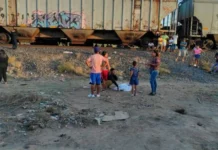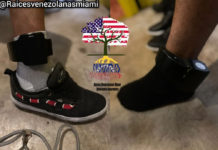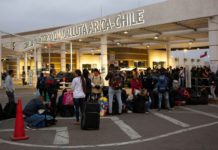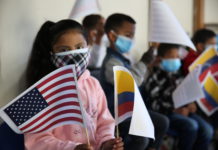
Marzo 16, 2017.-Since 2014, the Executive Office for Immigration Review docketing priorities have included unaccompanied minors and adults with children who were released at the border or from family detention.
This policy led to two vulnerable populations – Central American unaccompanied minors and mothers with children – having fast-tracked immigration hearings that, in the absence of a right to appointed counsel, tested the nonprofit legal community’s ability to offer representation. The consequences were that unaccompanied minors as young as 1 year old were being scheduled to appear in immigration court without any legal representation. Also less than 30 percent of adults with children were able to find representation.
However, as of Jan. 31, 2017, EOIR has changed its immigration court docketing priorities, under a memorandum issued by Chief Immigration Judge Mary Beth Keller. The docketing priorities now include the following: (1) all detained individuals; (2) unaccompanied children in the care and custody the Department of Health and Human Services, Office of Refugee Resettlement who do not have a sponsor identified; and (3) people who are released from custody on a Rodriguez v. Robbins, 804 F.3d 1060 (9th Cir. 2015), cert granted 136 S. Ct. 2489 (2016), bond.
As a result of the memo, adults with children, recent border crossers released from custody, and most unaccompanied children are no longer docketing priorities. These groups should therefore be scheduled for hearings as non-priority cases. This means their hearings will be likely be scheduled far into the future depending on the particular immigration court’s docket. Advocates should request de-prioritization from the immigration judge and ICE Enforcement and Removal Operations, especially if the non-citizen has an ankle monitor.
Here is a sample de-prioritization request form. However, if immigration court dates are scheduled far into the future, unaccompanied minors and adults with children must take care to file changes of address and, when required, changes of venue, and consistently check the EOIR hotline (800-898-7180) to avoid an in absentia removal order. An in absentia removal order will make them an enforcement priority.
Detained individuals, including juveniles, have always been a docketing priority, yet the memo specifically references this population. The reference to detained individuals could be in response to the Jan. 25, 2017 Executive Order on “Border Security and Immigration Enforcement Improvements.” It allocates resources to “immediately construct, operate, control, or establish contracts to construct, operate, or control facilities to detain aliens at or near the land border with Mexico.” It could also be in response to the Executive Order on “Enhancing Public Safety in the Interior of the United States,” which calls for more 287(g) agreements to help detain non-citizens. With such clear detention objectives delineated in these executive orders, immigration courts will need to replace non-detained dockets with detained dockets, and assign more judges over these dockets. Advocates are asked to report detention docket increases and immigration judges’ assignments to CLINIC.
The cases of respondents who have been released from detention pursuant to a Rodriguez bond remain a priority. Under Rodriguez, non-citizens within the jurisdiction of the 9th U.S. Circuit Court of Appeals who are detained for six months or more are entitled to an automatic bond hearing before an immigration judge. Those who are detained for more than 12 months are also entitled to automatic, periodic bond hearings at six-month intervals. This includes those subject to mandatory detention.
When a non-citizen is released on a Rodriguez bond and the case is transferred to a non-detained docket, the immigration court is instructed to schedule a master calendar hearing no earlier than 30 days following the respondent’s release from custody, and no later than 90 days after such release. After the first Master Calendar hearing, subsequent hearings should be scheduled “as soon as possible consistent with due process.” Without reference to a timeframe that could be consistent with due process, the memo seems to leave this timeframe to the discretion of immigration judges to be determined on a case-by-case basis. Advocates are asked to report to CLINIC the scheduling timeframes of subsequent hearings for a released Rodriguez bond beneficiary.
Unaccompanied children in the care and custody the Office of Refugee Resettlement at DHS, who do not have a sponsor identified, are the only unaccompanied minors who remain a docketing priority. These cases, which are often referred to by HHS/ORR as “Category 4: No sponsor identified,” are a case processing priority “as they will remain in HHS’s long-term care at the expense of the government.” While this case priority may seem sinister, under the current sponsor standards, approximately 85-90 percent of unaccompanied minors are released to sponsors. This is because unaccompanied minors are not designated as “Category 4” until efforts to reunify them have been exhausted. Once designated as “Category 4” – regardless of what type of custody they are in – these unaccompanied minors are mandated to receive legal counsel. At that point, the legal service provider is supposed to refer the unaccompanied minor to Long-Term Foster Care (if eligible) and/or represent the unaccompanied minor in short-term custody.
Under this new priority, the remaining 10-15 percent of “Category 4” minors will not be subject to prolonged detention in HHS/ORR custody, as they will have first right to the court’s calendar, and the immigration judge can continue to grant continuances as necessary. So long as the immigration judge provides the necessary continuances, it should not lead to a quick issuance of a removal order. As we monitor the impact of this new memo and the executive orders on these “Category 4” unaccompanied minors, if we find that unaccompanied minors are being removed quickly because of the priority designation conditioned upon the lack of a sponsor, we will argue that we have many potential sponsors ready to fill this gap.
CLINIC recently called for interested sponsors and received an overwhelming response of more than 200 potential sponsors. This list will help us negotiate this idea, notwithstanding the potential sponsor’s lack of connection to the family, while relying on the Flores Settlement Agreement that protects minors’ liberty interests. To be released from ORR custody, any sponsor must undergo the ORR family reunification process, even if they are a non-relative sponsor. The information on the sponsor process is here.
While the sponsor process presents hurdles for good Samaritans without family connections who wish to apply, becoming a foster parent is an important piece of the “Category 4 process,” as noted above, and they are urgently needed. The U.S. Conference of Catholic Bishops is recruiting foster parents for unaccompanied children. Potential foster parents in Texas, Michigan, Arizona, Virginia, New York, California, Washington, Mississippi, Florida and Utah should contact [email protected] for more information. Residents of in Colorado, North Dakota, Southern California, Michigan, Pennsylvania, Washington, Massachusetts or Washington, D.C. should contact Lutheran Immigrant and Refugee Services at [email protected]. For those in other areas of the country, please direct your inquiries to DCS [email protected]. Anyone interested in becoming a foster parent must follow state and agency guidelines for training and licensing.
https://cliniclegal.org/resources/new-priority-groups-immigration-court-docketing










